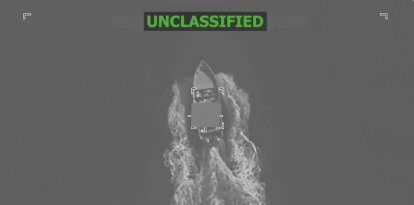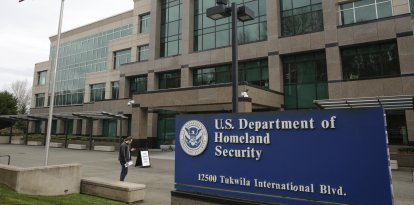After his conviction in New York, the question remains: Could Trump pardon himself if reelected?
While presidents constitutionally have the power to pardon federal sentences, in the “hush money” case, the Republican leader can't do much even after returning to the White House.

(AFP)
A jury in Manhattan, in a process highly questioned by various legal experts and Republican figures, found former President Donald Trump guilty of 34 counts of falsifying business records in the first degree.
Judge Juan Merchán has set a sentencing date of July 11 for the former president. According to experts, he could be sentenced to four years in prison or a much lighter punishment, such as a fine, community service, or, most likely, probation, considering his age and his lack of criminal history in New York.
However, a big question arose after the guilty verdict: could Trump pardon himself if elected president next November?
The answer is no. Read on to find out why.
The Constitution is clear: pardons are for federal sentences
The power of a presidential pardon is contemplated in Article II, Section 2 of the U.S. Constitution, which states that the commander-in-chief “shall have Power to grant Reprieves and Pardons for Offenses against the United States, except in Cases of Impeachment.”
According to The New York Times, individuals sentenced in cases brought by the states are not considered to have committed crimes against the nation, so a president would not have the power to pardon a convicted person in a case such as Trump’s brought by Manhattan U.S. Attorney Alvin Bragg.
Thus, for Trump to be pardoned on his state charges of falsifying business records, something extremely unlikely would have to happen: Democratic New York Governor Kathy Hochul, who recently attacked Trump supporters by referring to them as “clowns,” would have to pardon the former president.
That situation is nearly impossible. In fact, on Thursday, after the verdict was known, Hochul stated, “Today’s verdict reaffirms that no one is above the law.”
Trump still has an ‘ace’ to play
Therefore, even if he regains the presidency in November, Trump cannot pardon himself. However, he still has several legal avenues to clear his criminal record in New York. The first of these is an appeal.
Many legal experts, critical of the process that found Trump guilty, asserted that the former president has a good chance of overturning the conviction in an appeals court.
For example, attorney Colleen Kerwick told Newsweek that the issue of the forged documents at the center of the case being signed after the 2016 election was not addressed during the trial.
According to Kerwick, this gives Trump’s legal team a large window to assert that the documents could not have been used for voter fraud, disrupting the prosecution’s legal theory.
“The elephant in the room is that in order to sustain a felony conviction the records had to be falsified in furtherance of another crime, in this case violating New York election law,” Kerwick said. “That could not have been violated as the election was November 8, 2016, and the falsification was allegedly on February 14, 2017. The evidence was not sufficient to convict.”
The lawyer also stated that there are several specific grounds for appealing the verdict, including miscarriage of justice, error of law, and insufficiency of evidence.
Kerwick also said that Judge Merchán, who has been heavily criticized by Trump and must now decide whether or not to send the former president to jail, greatly helped the prosecution’s case during the part of the process known as “judge’s instructions.”
According to the lawyer, the judge’s instructions helped the jurors reach a guilty verdict quickly.
For this and several other reasons, an appeal is a viable option for Trump.
The problem is that this proceeding could take several months and not be resolved until well beyond the election, so the Biden campaign could if it wanted to, attack Trump using the guilty verdict in Manhattan.

























